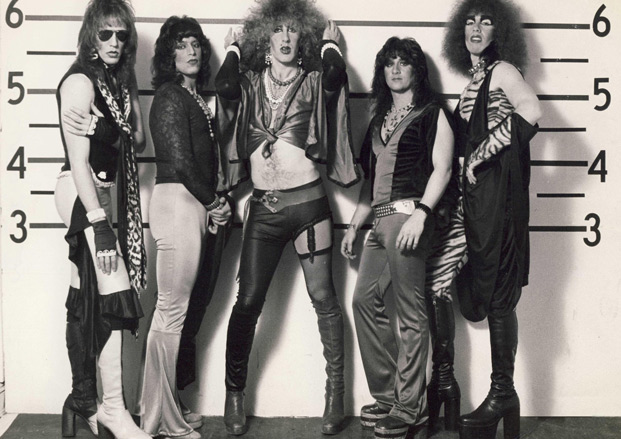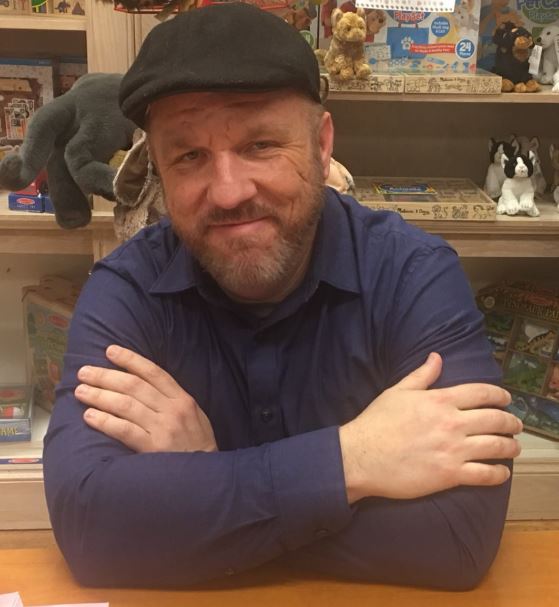‘We Are Twisted F***ing Sister’: Jay Jay French Talks New Documentary and Final Tour

We Are Twisted F***ing Sister, a new documentary by director Andrew Horn, captures Twisted Sister’s rise from bar band to international super-stardom.
The film, which features rare concert footage and photo, plus interviews with band members, management and some of the world's biggest Twisted Sister fans, relays the never-before-told story of the 10 grueling years leading up to Twisted Sister’s breakout success.
We Are Twisted F***ing Sister, the first-ever official documentary of the band, opened in Los Angeles February 15. It will open in New York this Friday, February 19, and there's also a special one-night-only event scheduled for Chicago’s Music Box Theatre February 22.
On February 23, the film will be released on DVD, Blu-ray, VOD and digital formats with two hours of bonus material and director commentary.
Twisted Sister consists of Dee Snider, Jay Jay French, Eddie Ojeda and Mark “The Animal” Mendoza. Original drummer A.J. Pero died in 2015 at age 59.
I recently spoke with French about the new documentary as well as Twisted Sister’s plans for 2016.
I’d like to start off by asking you about the recent passing of David Bowie, who played a big role in your early years. How influential was he to you and your music?
Get The Pick Newsletter
All the latest guitar news, interviews, lessons, reviews, deals and more, direct to your inbox!
He was a huge influence. Hunky Dory and Ziggy Stardust changed my life. They altered my world and changed me from a Grateful Dead hippie into a glitter guy. Where the Beatles gave me my dream, Bowie gave me direction and took me to the stars. I cut my hair off and dyed it blonde because I wanted to be Mick Ronson.
Everything just sort of hit at the same time after that. I used to see the New York Dolls every Sunday at the Mercer Arts Center. One night, Bowie was there. Then Bowie played Carnegie Hall on September 28, 1972, and I said, “That’s it, I’m sold!” That’s when word went out and I soon got a call from someone who told me some guy he knew had told him I wanted to be in a glitter band. That band was Silver Star, which changed its name in February 1973 and started performing under the name Twisted Sister.
How did the idea for the Twisted Sister documentary originate?
It came about through a consonance of coincidences. I was being interviewed by the director, Andy Horn, for another documentary on the life of a German-born performance artist named Klaus Nomi. It just so happened that Klaus and Twisted Sister had crossed paths one night in the early Eighties when Klaus opened up for us at a nightclub in New Jersey. The reaction of the crowd to his performance was very negative and a complete disaster. So they wanted to discuss that night with me.
When Andy came over, I asked him how much he knew about Twisted Sister. He admitted he didn’t know much, so over the next few hours of talking I overwhelmed him with the story about Klaus and other historical facts. That’s when he said, “Whoa! This is another story that needs to be told!” That’s how it evolved.
The band played the club circuit for years without much label interest. How did the band persevere during that time?
I like to say we were turned down more often than a bed sheet in a whore house [laughs]. I still have a piece of paper with a rejection sheet that my manager gave me at the time saying, “Why aren’t we signed?” You’re too green…. You’re too blue…Your pants are too pink…Your lipstick is too red. Alice Cooper is over… Kiss is dead.” Just a plethora of rejection.
Meanwhile, we just kept honing our craft. It was fascinating to witness the evolution of the band and how we overcame rejection. The movie tells the story of how a band survives and tries in the face of rejection, and that’s what makes it so great.
Was there ever a point where you thought that maybe the band just wasn’t going to make it?
I would say it was when the record label abruptly went bankrupt after we finally got our deal. When that happened, it was the only time I thought maybe it just wasn’t meant to be, because we had been rejected so much. But it’s like what I tell people when I do public speaking: When you’re handed rejection but still believe you got it right and the world just hasn’t figured it out, you have to do four fundamental things: mourn the rejection, reflect, retool and reapply. That’s what we learned how to do.
What does Twisted Sister have planned for this year?
We’re going to release the movie as well as a DVD of a live show in Las Vegas that was dedicated to A.J. Pero, who passed away last year. We also have a final box set and another three-part, live CD box coming out of famous shows from back in the bars along with a handful of dates. This year is going to be it for us.
Of all the highlights of Twisted Sister’s historic career, what are you most proud of?
Just the fact that it happened was amazing. We learned our craft and forged our character in the fires of the club scene. Five nights a week, 52 weeks a year, three to four shows a night. We’re constantly considered the greatest live band in the world and are leaving at the top of our game. The business will continue on, we just won’t be playing. But for me to be running around on stage at 63, plugged into six Marshall stacks nearly 50 years after I started playing guitar, I have to say it doesn’t suck! After 40 years and 9,000 shows, it’s been an amazing run—and I’m proud of it all.
For more about Twisted Sister, visit twistedsister.com.
James Wood is a writer, musician and self-proclaimed metalhead who maintains his own website, GoJimmyGo.net. His articles and interviews are written on a variety of topics with passion and humor. You can follow him on Twitter @JimEWood.
James is a guitarist and freelance writer who's interviewed some of the biggest names in music. He is the author of four books and his writing credits include work for Guitar World, AXS and Yahoo! as well as for his hometown newspaper where he writes on a variety of topics with both passion and humor. As a guitarist, he's performed everywhere from local bars and nightclubs to some of the biggest stages in front of thousands of music fans.
“His songs are timeless, you can’t tell if they were written in the 1400s or now”: Michael Hurley, guitarist and singer/songwriter known as the ‘Godfather of freak folk,’ dies at 83
“The future is pretty bright”: Norman's Rare Guitars has unearthed another future blues great – and the 15-year-old guitar star has already jammed with Michael Lemmo










